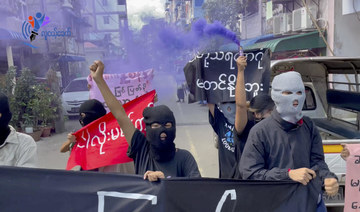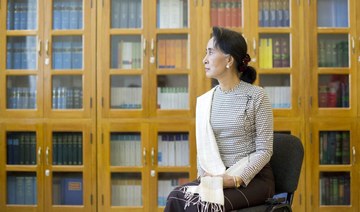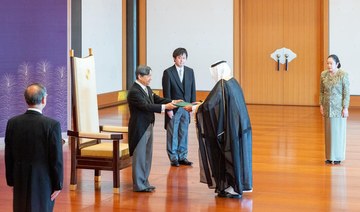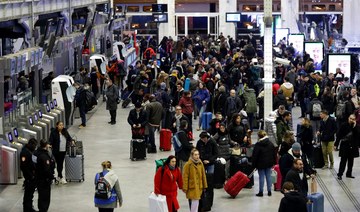PHNOM PENH: Malaysia is set to lead a push for tougher action on Myanmar when a regional bloc of foreign ministers meet this week, as anger mounts at the junta for stonewalling crisis resolution efforts.
The 10-country Association of Southeast Asian Nations (ASEAN) — which has spearheaded so far fruitless diplomatic efforts to restore peace — last week condemned the junta’s execution of four prisoners.
Myanmar has been in chaos since a putsch in February last year and the death toll from the military’s brutal crackdown on dissent has passed 2,100, according to a local monitoring group.
Ministers meeting in Phnom Penh from Wednesday are expected to lament the lack of progress on ASEAN’s “five-point consensus” plan, agreed to in April last year, which called for an immediate end to violence and dialogue between the junta and coup opponents.
As well as voicing “deep concern” about recent developments and calling for restraint, the ministers will also demand “concrete actions to effectively and fully implement the Five-Point Consensus,” according to a draft communique obtained by AFP.
After more than a year of no progress on the plan, Malaysia will present a framework for its implementation, even as critics deride the ASEAN as a toothless talking shop.
“The key element of the framework is there must be an end-game. You have to have an end-game. What is the end-game of the five-point consensus?” Malaysian Foreign Minister Saifuddin Abdullah said.
Within the bloc, frustrations are growing after the Myanmar junta went ahead with its first executions in decades despite personal pleas from Cambodian Prime Minister Hun Sen.
Among the four executed were Phyo Zeya Thaw, a rapper-turned-lawmaker from ousted civilian leader Aung San Suu Kyi’s National League for Democracy party and veteran political activist Kyaw Min Yu — better known as “Jimmy.”
“It shows the junta is making a mockery of the (consensus plan),” Saifuddin wrote in a weekend newspaper article.
Singapore’s Foreign Minister Vivian Balakrishnan characterized the executions as a “grave setback” to ASEAN’s efforts to resolve the crisis, while Thailand’s foreign ministry spokesman Tanee Sangrat said the move “aggravates the vexing problems of Myanmar.”
A senior ASEAN diplomat said he does not expect any country to go as far as calling for Myanmar’s expulsion from the bloc.
But some members, led by Malaysia and the Philippines, want to bar the military regime from sending ministers to all ASEAN meetings — including November’s summit — until there is progress on the five-point plan.
“Political appointees of the administration, especially the military administration are not welcome,” the Philippines’ Assistant Foreign Secretary for ASEAN Affairs Daniel Espiritu said.
Myanmar’s top diplomat, Wunna Maung Lwin, has not been invited to Phnom Penh and was also left out of a foreign ministers’ retreat in February, while junta leader Min Aung Hlaing was snubbed at a leaders’ summit last year.
“Even North Korea is welcome at this forum but the Myanmar junta isn’t... it has to be recognized just how isolated Myanmar is, even in its neighborhood,” said Aaron Connelly, a Southeast Asia specialist at the International Institute for Strategic Studies.
Along with the Ukraine-Russia conflict, ongoing South China Sea tensions will be another hot button issue on the agenda.
US Secretary of State Anthony Blinken will fly in, with Chinese Foreign Minister Wang Yi and Russia’s top diplomat Sergei Lavrov also expected to attend and hold meetings with the ASEAN ministers.
But analysts do not expect a repeat of 2012 when Cambodia — a key Beijing ally — last hosted ASEAN and was accused of siding with China on the disputed sea, resulting in no communique being issued.
“Cambodia has learnt its lesson. It was the first time ASEAN didn’t come up with a joint statement and Cambodia got big blowback from it,” said Thailand’s Chulalongkorn University analyst Thitinan Pongsudhirak.
“Hun Sen ... doesn’t want to shoot himself in the foot again.”
China claims most of the sea — with competing territorial assertions from Brunei, Malaysia, the Philippines, Taiwan and Vietnam.
ASEAN foreign ministers to push for tougher action on Myanmar
https://arab.news/g3bqj
ASEAN foreign ministers to push for tougher action on Myanmar
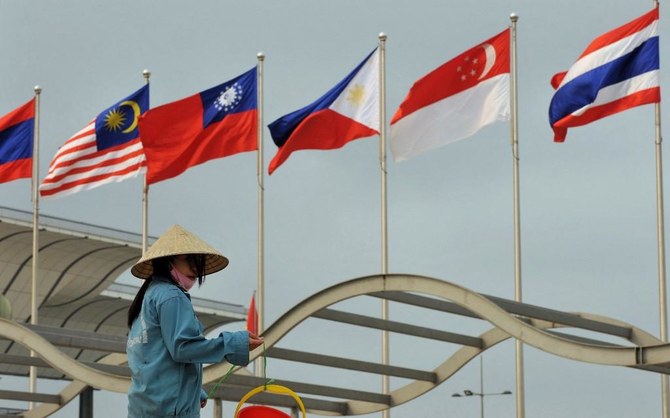
- Myanmar has been in chaos since a putsch in February last year
- Frustrations are growing after the Myanmar junta went ahead with its first executions in decades
Saudi Ambassador to Japan outlines growth opportunity in bilateral ties

- Dr. Binzagr expressed his belief that the next 70 years will be even more significant
- He highlighted the deep appeal of Japanese culture to the youth of Saudi Arabia
TOKYO: Recently appointed Saudi Arabian Ambassador to Japan Dr. Ghazi Binzagr emphasized the ‘exceptional’ nature of the relationship between the two countries over the last 70 years.
He expressed his belief that the next 70 years will be even more significant, as both nations strive to diversify beyond the traditional anchors of their relationship, foreseeing a future of mutual prosperity and growth.
Dr. Binzagr’s remarks were made during a press conference for Japanese media and was organized by Arab News Japan and was held at the Foreign Correspondents’ Club of Japan on Friday.
It was held on the occasion of the conclusion of last week’s Saudi Japan Business Forum, which was attended by prominent Saudi ministers and business executives.
Describing the way forward as ‘an evolution of priorities’, Ambassador Binzagr highlighted the potential of the new relationship in exploring new sources of energy that will benefit both countries. He emphasized the importance of asserting their relevance in new global realities, which, he believes, will involve working together to co-create values in emerging technologies, as well as elements of soft power such as sports and entertainment.
There has always been a tremendous interest in Japan in Saudi Arabia, Ambassador Binzagr said, stemming from the products Japan produced and exported to the world but now “including softer products such as anime that have had a profound effect on a rising curiosity from a whole generation in Saudi Arabia that is increasingly choosing Japan as a destination to visit.”
Dr. Binzagr highlighted the deep appeal of Japanese culture to the youth of Saudi Arabia, not just at a superficial level, but at a profound level that has sparked a desire to visit and study in Japan, to learn Japanese and understand the history and culture of the country. He expressed his belief that this cultural dimension will be an additional pillar in the already strong relationship between the two nations, fostering a deeper understanding and appreciation of each other’s cultures.
The Ambassador hopes that a reciprocal feeling will develop within the Japanese to learn more about Saudi Arabia but admits that the desired level hasn’t been reached yet. Now, he says, Saudi Vision 2030 has opened the doors to tourists and allowed Japanese and others the opportunity to discover more about the history and culture of the Kingdom.
Ambassador Binzagr reiterated the importance of strong, sustainable relations that are built on shared interests and values. He emphasized that both Saudi Arabia and Japan share a strong commitment to global peace and the significance of robust multilateral institutions.
This shared commitment, he believes, will not only ensure the stability of their relations but also pave the way for further decades of friendly and fruitful collaboration between the two nations.
German police shoot knifeman who attacked far-right demo

- Social media footage showed a bearded man in glasses attacking people in the city’s central Marktplatz square with a knife
- “A firearm was used against the attacker,” Mannheim police said
BERLIN: German police said they shot and wounded a man armed with a knife who attacked a right-wing demonstration in the southwestern city of Mannheim on Friday.
Social media footage showed a bearded man in glasses attacking people in the city’s central Marktplatz square with a knife. One person appears to be stabbed in the leg and a policeman who tries to intervene appears to be cut in the neck. Another policeman then shoots the attacker.
“A firearm was used against the attacker,” Mannheim police said in a statement. A rescue helicopter was in attendance.
No information was available on the identity or motives of the attacker and police said they could not yet give details about any injuries among the demonstrators in the square.
“My thoughts are especially with the seriously injured police officer,” said Interior Minister Nancy Faeser in a social media post.
A livestream broadcast from central Mannheim showed anti-Islam activist Michael Stuerzenberger preparing to address a small crowd at an event put on by the anti-Islam Pax Europa Movement.
The footage bore a watermark linked to the movement’s “Open Eyes” tour.
The violence comes in the final stretch of a European parliament campaign in which the far-right Alternative for Germany party has campaigned partially on what the party says is the danger posed by migration from Muslim countries.
“If investigations show an Islamist motive behind the attack, that would be yet another confirmation of the great danger posed by Islamist violence, which we have been warning about,” Faeser, a Social Democrat, added.
“The attacker must be punished severely,” added Chancellor Olaf Scholz in another post.
Stuerzenberger, 59, who describes himself as an Islam-critical journalist, has been a member of several far-right anti-Islam organizations, including the PEGIDA movement that holds regular marches in cities especially in eastern Germany.
Police said there was no longer any immediate danger to the public.
Zelensky hails US weapons green light as ‘step forward’

- Washington gave the green light on Thursday for Ukraine to use US weapons to defend its Kharkiv region
- Germany on Friday said it too had given Ukraine permission to fire German-delivered weapons at targets in Russia
STOCKHOLM: Ukrainian President Volodymyr Zelensky on Friday hailed a US decision to partially lift restrictions on using US-donated weapons to strike inside Russia as a “step forward.”
Washington gave the green light on Thursday for Ukraine to use US weapons to defend its Kharkiv region on the border with Russia, overcoming previous concerns that authorizing such strikes could drag NATO into a direct conflict with Russia.
“This is a step forward toward (the) goal... of making it possible to defend our people who live in the villages on the border,” Zelensky said during a visit to Stockholm.
Germany on Friday said it too had given Ukraine permission to fire German-delivered weapons at targets in Russia.
Kyiv has the “right under international law to defend itself” against attacks coming from inside Russia, close to the border with Ukraine, German Chancellor Olaf Scholz’s spokesman Steffen Hebestreit said.
“To this end, it can also use the weapons supplied for this purpose... including those supplied by us,” he said.
The Kremlin accused the West on Thursday of “entering a new round of escalations in tensions.”
And on Friday Kremlin spokesman Dmitry Peskov said that US-made weapons “are already being used to attempt strikes on Russian territory.”
“This is quite eloquent evidence of the extent of US involvement in this conflict,” he said.
But NATO secretary general Jens Stoltenberg, speaking to reporters at a meeting of alliance foreign ministers in Prague, responded: “This is part of efforts by President (Vladimir) Putin and Moscow to prevent NATO allies from supporting Ukraine to defend themselves.”
“Ukraine has the right for self-defense and we have the right to help Ukraine,” he said.
However, divisions on the issue between NATO member states have emerged.
Italian Foreign Minister Antonio Tajani said that “for Italy, it is impossible to use our weapons outside of Ukraine.”
“We are not fighting against Russia. We’re defending Ukraine and it is not the same,” he said.
The change in Washington’s thinking was attributed by US officials to Russia’s daily pounding of Kharkiv, Ukraine’s second biggest city.
In the latest Russian strikes on the city overnight, six people were killed and 25 wounded, including two children, officials said.
Yulia, a local resident who fled to a basement in the night for shelter, said there were several explosions in the night.
“We are all just shocked by what we experienced. Honestly, I wouldn’t wish it on my worst enemy,” she told AFP.
“These are monsters, these are not people. People cannot do such a thing in the 21st century,” she said.
Regional governor Oleg Synegubov said the rubble was still being cleared.
“There may be more people under it,” he said.
Zelensky has pressed Western allies for more support.
“Only together we can stop the madness from Moscow,” he said at a press conference in Stockholm.
While expressing gratitude to Western allies for weapons supplies, he said there were often delays in deliveries.
“It can take six months or more from the moment the package is approved to the moment it is used.... Our biggest enemy is slow supply,” he said.
Ukraine has intensified strikes on Russian targets in recent months, claiming drone attacks on military and energy infrastructure targets deep inside the country.
Russia’s military said on Friday it had shot down 29 Ukrainian drones overnight that were targeting the port city of Novorossiisk and an oil depot in Temryuk.
The increasing intensity of strikes has come as Russian troops have made gradual advances in Ukraine this year after holding off a Ukrainian counter-offensive last year.
Russian Defense Minister Andrei Belousov said Moscow’s forces had seized 880 square kilometers (340 square miles) of territory so far in 2024.
“The advance is underway in all tactical directions,” he said at a meeting of the Russian-led CSTO security alliance in Almaty, according to Russian news agencies.
Safer to train Ukrainian troops in Poland, says Polish minister

- European Union countries have been debating whether to train troops on the ground in Ukraine, but have yet to reach a common position
- “This would be a more effective way of helping Ukraine,” Radoslaw Sikorski told reporters
WARSAW: Poland decided it would be safer to train Ukrainian troops in Poland rather than sending its own troops to Ukraine, the Polish foreign minister said on Friday during a meeting of NATO foreign ministers in Prague.
European Union countries have been debating whether to train troops on the ground in Ukraine, but have yet to reach a common position.
“Poland considered the Ukrainian request regarding training, but we came to the conclusion that it would be safer and more efficient to train a Ukrainian unit composed of Ukrainians in Poland... and that this would be a more effective way of helping Ukraine,” Radoslaw Sikorski told reporters.
France could soon send military trainers to Ukraine despite the concerns of some allies and criticism by Russia, and may announce its decision next week during a visit by the Ukrainian president, Reuters reported on Thursday.
Sikorski also said that there were no restrictions attached to the use of weapons Poland supplies to Ukraine.
Speaking earlier on Friday, Sikorski said Poland is currently organizing its 45th package of aid for Ukraine.
“Poland has sent 44 packages of aid to Ukraine, we are now organizing our 45th... we think we’ve contributed in military assistance alone around 4 billion euros ($4.35 billion),” Radoslaw Sikorski told reporters at a meeting of NATO foreign ministers in Prague.
Bangladeshi pilgrims enjoy ‘easy and comfortable’ immigration under Makkah Route

- New equipment makes pre-departure process even faster than in 2023
- Saudi officials are working round the clock to assist Bangladeshi pilgrims
DHAKA: Bangladeshi pilgrims welcomed on Friday the updated Hajj immigration procedures under the Makkah Route initiative, which this year is even smoother than in 2023.
This year, Hajj is expected to start on June 14, and special pilgrimage flights from Dhaka began on May 10.
Most pilgrims are departing under the flagship pre-travel program, which was launched by the Kingdom in 2019 to help pilgrims meet all the visa, customs and health requirements at their airport of origin and save them long hours of waiting before and upon arrival in Saudi Arabia.
The immigration processes have been constantly updated to streamline the procedures and accuracy of delivering the pilgrims’ luggage straight to their hotels in Makkah and Madinah.
This year, new software and hardware were added, making it even faster than in 2023, Turki Al-Zahrani, an official from the Saudi immigration department overseeing the operations at Dhaka airport, told Arab News
“This year, from Hazrat Shah Jalal International Airport in the capital, Dhaka, we have the latest technologies,” he said. “There is no need to wait in the airport.”

Pilgrims appreciated the way the facility was organized at the airport as they readied to board their flights to the Kingdom.
“The Makkah Route initiative has excellent management,” said Dr. Mohammed Saiful Islam, professor at Jahurul Islam Medical College. “We are so happy.”
Saudi Arabia granted Bangladesh a quota of 127,000 pilgrims to perform the spiritual journey that is one of the five pillars of Islam, but due to high airfares to the Middle East, only about 83,000 will be able to travel.
So far, over 51,400 of the pilgrims have reached Saudi Arabia since the start of the special Hajj flights.
For Sabina Ahmed, a homemaker from Gopibag in Dhaka, who was flying to the Kingdom on Friday, the whole immigration procedure from the Saudi side took only a few seconds.

“All the immigration formalities have been completed very smoothly. I felt really very good experiencing this,” she said.
“The luggage management system was also, mashallah, very good … Everything went so smoothly that it was beyond imagination.”
Amanur Rahman, a software engineer, who performed the pilgrimage also in 2016, said that under Makkah Route, everything was streamlined.
“This is really amazing … Nowadays, it’s really easy, and it’s really comfortable for us,” he told Arab News. “Thanks to the Saudi government for giving us this kind of facility. We are really excited about this.”
Saudi officers at the airport were working round the clock to make sure everything went well. Bangladeshi pilgrims noticed and welcomed the efforts.
“We appreciate it,” Golam Mostofa Himel, a banker, said after processing his immigration documents. “It’s very easy and comfortable for us.”



